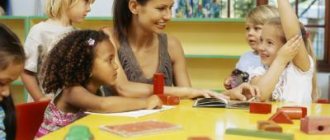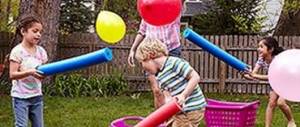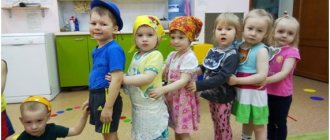Adaptation in kindergarten is the process of a child getting used to the new conditions of his life: the room, the daily routine, teachers and other children around. In kindergarten there are new requirements and rules that you also need to gradually get used to. Some children adapt very easily - they run into the group without tears. They play, have fun and don’t want to go home. Others just can’t tear themselves away from their mother. They cling to her, cry loudly and are afraid to enter the group. What kind of adaptation will be in kindergarten depends on the parents, teachers and the child himself.
Degree of child adaptation
There are three degrees of adaptation in kindergarten: easy, moderate and severe. Which of them will happen to a particular child depends on many factors: relationships in the family, the pedagogical skills of educators, and the characterological characteristics of the child himself.
Lightweight
Easy adaptation to kindergarten takes place in a short time: within 2-4 weeks the baby gets used to kindergarten, is not afraid to go there and happily goes to the group. This degree of adaptation can be judged by the following signs:
- the baby calmly enters kindergarten and group, without crying or hysterics;
- communicates happily with teachers, does not hide from them, is not afraid to look them in the eyes, can calmly tell them about his need at the moment;
- successfully communicates with the guys from the group;
- responds adequately to verbal encouragement or reprimand from teachers;
- if she can already speak, she emotionally tells her parents about what happened in kindergarten today.
Average
The average adaptation of a child in kindergarten takes longer - up to one and a half months. At the same time, the baby cries or gets angry when he goes to kindergarten, does not always want to go to the group, but nevertheless joins the team and a new life, albeit slowly. This level of adaptation is indicated by the following signs:
- the child does not go to kindergarten much and is often sick;
- has a hard time parting with her mother, does not want to let her go, cries for some time after she leaves the kindergarten;
- after a short time he calms down and begins to play with other children;
- complies with the institution's regulations;
- responds adequately to positive and negative statements from the teacher about his behavior and actions.
Heavy
Difficult adaptation in kindergarten is typical for children with high sensitivity, low levels of socialization, or increased aggressiveness. In this case, adaptation can last from a couple of months to several years; sometimes the baby does not adapt to the child care facility and parents have to take him to home education. This degree of adaptation is quite rare. Signs by which it can be identified:
- lack of contact with teachers and peers for more than two months;
- crying, stupor or aggression for a long time after the parents leave - more than an hour;
- refusal to accept the kindergarten routine: does not eat, does not sleep, does not participate in developmental and educational activities, does not play with children;
- tears, fear or aggression in response to the words of teachers.
Ways to overcome difficult adaptation include timely contact with a psychologist, constant contact with the child and teachers, and establishing a trusting relationship with the baby. Sometimes it is useful to take a break from visiting a preschool educational institution for 1-2 months.
Depending on the child’s degree of adaptation to kindergarten, parents and teachers need to build their own ways of interacting with the baby: one just needs to be supported, another needs to be encouraged, and another needs to be pitied. If adults manage to find a suitable behavior strategy, then soon the child’s psychological and physical adaptation to kindergarten will end, and he will go there more calmly.
Forms of work with parents during the period of adaptation to preschool educational institutions.
Forms of work with parents during the adaptation period.
Preschool age is a unique, valuable and most important period in the development of a person and his health. The first years of a child’s life are an important stage in his formation.
Accompanying a child in a preschool educational institution is a multilateral process that includes the interaction and work of teachers and specialists in various areas. The most important activities of specialists are the prevention of various disorders of the health and development of children, as well as educating adults on issues of accompanying a child during the adaptation period. The main point of education and support is to develop the pedagogical competence of parents, to acquaint them with the basic patterns and conditions for the favorable mental development of a child, to create a need for knowledge and a desire to use it in education. Help the family, find answers to questions of interest in raising children, attract them to cooperation in terms of common approaches to raising a child.
Enrolling a child in a preschool institution is a difficult process for both the child and the parents. For a child, this is a strong stressful experience that needs to be mitigated. The baby will have to adapt to completely different conditions than those to which he is accustomed in the family. A clear daily routine, the absence of parents, a different style of communication, contact with peers, a new room - all these changes create a stressful situation for the child. All this can cause a defensive reaction in the baby in the form of crying, refusal to eat, sleep, or communicate with others. Both teachers and parents must understand how important the moment a child enters kindergarten is, how serious, although not immediately obvious, consequences it can have. The course of the adaptation period and its further development depend on how prepared the child is in the family for the transition to a child care institution. In order for a child’s adaptation to kindergarten to be as painless as possible, the family needs professional help and an integrated approach to solving the problem of adaptation.
For a preschooler, the family is a vital social environment that determines the path of development of his personality. The love of parents provides the child with emotional protection and psychological comfort, giving him support in life. Parental love, like nothing else, contributes to the emergence and strengthening of a child’s self-esteem and self-esteem. Modern families, different in composition, cultural traditions and views on education, have different understandings of the child’s place in the life of society. Significant efforts are required from parents to strengthen their own love for their child, to learn to show it in the most beneficial way for him, evoking the child’s reciprocal feelings. However, they are all united in wanting the very best for their baby, but, unfortunately, not everyone is ready to respond to the various initiatives of the kindergarten. And our task is to attract parents to cooperation, to interest parents and involve them in the creation of a single cultural and educational space “kindergarten-family”, through all kinds of methods and techniques.
Along with traditional forms of work - conversations, parent meetings, surveys, I try to use new modern opportunities, including ICT:
- design of “parent corners”,
- information stands,
- clear consultations,
- reminders,
- booklets,
- mini magazines,
- essay writing my child.
- frontal and individual surveys of parents, study of the social portrait of pupils’ families;
- trust mail
- magazines informing parents about various aspects of children's development.
- multimedia presentations,
- posting information on the preschool educational institution website
All developments are adapted for use in both group and individual counseling settings.
In addition to demonstration and didactic developments, I actively use a photo and video camera in my work, as well as digital resources, which I later use for conducting group parent events in the form of a club, and joint design and research activities. The work of the “Young Family” club is structured in such a way as to strengthen the relationship between parents and the child, as well as to establish relationships between the family and preschool teachers.
GOAL of the “Young Family” club:
Overcoming the barrier of parental distrust in preschool educational institutions and establishing trusting relationships between families and teachers, improving the pedagogical culture of parents in matters of development and education of young children and implementing adaptation measures when children move from the home environment to preschool educational institutions, promoting positive experiences of family education.
TASKS:
- Involving parents in joint interaction with teachers and preschool specialists to strengthen partnerships with families, join forces for the development and upbringing of children, create an atmosphere of community of interests, emotional mutual support and mutual insight into each other’s problems.
- To acquaint parents with the age characteristics of their children, to increase their level of knowledge, as well as parents’ understanding of their own child about the characteristics and patterns of their development, about the individual qualities of their children;
- To form the ability to establish and develop relationships with a child on the basis of partnership and cooperation, to teach the skills of adequate and equal communication, the ability to prevent and resolve interpersonal conflicts;
- To develop the ability to develop new skills of interaction with a child, strengthening parents’ confidence in their own educational capabilities;
- Teach reflection;
- Introduce various methods and techniques, games, exercises in teaching children;
- Provide assistance to parents on issues of maintaining and strengthening the health of their children, as well as the health of the parents themselves.
The club's work covers several areas:
- Consulting work;
- Preventive work;
- Developmental work;
- Diagnostic work.
By attending club events, parents begin to see those features that often escape their attention in everyday life. They become more sympathetic to their children and learn to treat them non-judgmentally, with understanding, creating an atmosphere of acceptance in which the child can feel quite safe. Parents begin to perceive and feel the failures and joys of their children differently, learn to cooperate with the child and create something together - while in play, and later in action. Here they practice communication skills and learn ways to solve problems, which in the future facilitate interaction within the family. Viewing fragments of organized and independent children's activities, accompanied by comments from educators and specialists, not only expands parents' ideas about their children, but also brings them together, forming a cohesive parent-child team. This work is carried out regularly and is systematic, which makes a significant contribution to the harmonization of the ideas, positions and actions of parents and teachers as participants in the educational space.
The duration of adaptation depends on the individual characteristics of each child, on the correct approach of adults to the adaptation of children. If a child is active, sociable, and inquisitive, his adaptation is relatively easy and quick.
The other baby is slow, noise and loud conversations irritate him, he does not know how to feed himself or undress. Such a child needs a longer period of adaptation.
Observing parents and analyzing the questionnaires that parents filled out, I noted several problem areas during the child’s adaptation to preschool education:
- parents' unpreparedness for a child's negative reaction to preschool;
- parents are frightened by the child’s tearfulness, confused, because at home he willingly agreed to go to kindergarten;
- parents do not evaluate tearfulness as a probability of a preschooler’s normal state during the period of adaptation to kindergarten;
- many parents are not ready for the need to be patient during this difficult period for the baby;
- parents themselves are in a state of concern and anxiety: they think that they are not good enough in the role of “mom” and “dad”;
- Parents do not always agree that children feel mom or dad’s concern on a subtle emotional level, and this further increases children’s anxiety.
Targeted training of parents and teachers of preschool educational institutions produces positive results even with difficult adaptation; this facilitates the child’s adaptation to new conditions; this is a manifestation of parents’ interest in the work of the preschool educational institution, in raising children, and improving child-parent relations;
- increasing the competence of parents in psychological, pedagogical and legal issues;
- an increase in the number of requests to the teacher with questions, for individual consultations with specialists;
- increasing interest in events held at preschool educational institutions;
- increasing the number of parents participating in joint events;
If parents and teachers combine their efforts and provide the child with protection, emotional comfort, and an interesting and meaningful life in kindergarten and at home, then we can confidently say that the changes that have occurred in the child’s life are for his benefit.
Therefore, an educational institution has the opportunity to directly influence the families of students. The educational functions of a preschool institution and a family are different, but for the comprehensive development of a child, their interaction is necessary.
The level of pedagogical culture of parents, and, consequently, the level of education, depends on the quality of purposeful joint activities of parents and preschool institutions. Positive results in raising a healthy child can be achieved with the support, desire and close cooperation of teachers with the families of pupils. Strengthening and developing close connections and interaction between a preschool institution and a family provides favorable living conditions for raising a healthy child, and the formation of the foundations of a full-fledged, harmonious personality.
References:
- Afonkina Yu.A. “Psychological and pedagogical support in preschool educational institutions for the development of an early child”: Methodological manual. - M.: ARCTI, 2010. - 80 p. (Growing smart)
- Belkina L.V. ''Adaptation of young children to the conditions of a preschool educational institution: A practical guide'' - Voronezh "Teacher", 2006. - 236 p.
- '. – M.: Education.2007. – 79 p.
- Lapina I.V. “Adaptation of children upon entering kindergarten: program, psychological and pedagogical support, comprehensive classes.” Volgograd: Teacher, 2010.- 127 p.
- Rusakov A.S. » Adaptation of a child to kindergarten. Advice for teachers and parents: Collection. " - St. Petersburg: Speech, Educational projects; M.: Sfera, 2010. - 128 p.
- Lapshina T.V., Solovyova I.A. Analysis of innovative work on the introduction of information and communication technologies into the educational activities of a preschool institution. // Innovative work of educational institutions in the Ivanovo region. Collection of scientific materials. Issue 2. – Shuya: State Educational Institution of Higher Professional Education “Shuya State Pedagogical University”, 2010.
Types of adaptation of children
Types of adaptation in kindergarten also vary depending on what behavior strategy the child chooses. Some cry for a long time at first, and after a couple of weeks they happily go to the group, others at first enthusiastically join in the activities and games, and after a while they just can’t let their mother leave the locker room. What kind of adaptation a particular baby will have depends on his individual characteristics.
Active
Adaptation to kindergarten of this type is most common. In the first two or three weeks, the child feels anxious: he worries when he goes to kindergarten, cries when parting with his parents, and is sad that tomorrow he needs to go to the children again. But soon there are fewer tears, the baby begins to feel safe, and more and more confidently makes contact with teachers and children.
Passive
This adaptation of a child to kindergarten often goes unnoticed by parents. The fact is that the baby goes to kindergarten with practically no problems: he doesn’t throw tantrums, doesn’t cry in the locker room, doesn’t cling to his mother. But things are changing for him that, it would seem, do not apply to kindergarten: sleep and appetite are deteriorating, fatigue increases, and moodiness in the evenings. These symptoms disappear after a few weeks and the child’s condition improves.
Postponed
Adaptation of a child to this type of kindergarten usually greatly disappoints parents. In the first 2-3 weeks, the baby seems to be successfully going to kindergarten: he does not shed tears, does not refuse sleep or food, and has excellent contact with participants in the educational process. But one day the day comes when the child behaves the way children with active adaptation behaved in the initial stages: he cries, does not let go of his mother, does not want to go to kindergarten, does not want to communicate with teachers and play with children. The further process usually takes place according to the type of active adaptation of children to kindergarten.
“Features of organizing the work of a teacher during the period of adaptation of children to the conditions of a preschool educational institution”
MUNICIPAL AUTONOMOUS PRE-SCHOOL EDUCATIONAL INSTITUTION KINDERGARTEN No. 8 “OGONEK”
Consultation for teachers:
“Features of organizing the work of a teacher during the period of adaptation of children to the conditions of a preschool educational institution”
Prepared by:
Teacher Shuvakova M.B.
2018
Consultation for early childhood educators:
“Features of organizing the work of a teacher during the period of adaptation of children to the conditions of a preschool educational institution”
Work with parents, which must begin before the child enters kindergarten.
A necessary condition for successful adaptation is the coordination of the actions of parents and educators.
Even before the child enters the group, educators should establish contact with the family. It is difficult to immediately find out all the habits and characteristics of a child, but in an introductory conversation with parents you can find out what the characteristic features of his behavior, interests and inclinations are.
It is advisable to recommend that parents bring their child only for walks in the first days, as this will make it easier for him to get to know the teachers and other children. Moreover, it is advisable to bring your baby not only for a morning walk, but also for an evening walk, when you can draw his attention to how mothers and fathers come for their children, how joyfully they meet. In the first days, it is worth bringing your child to the group later than 8 o’clock, so that he does not witness the tears and negative emotions of other children when parting with his mother.
Parents, sending their child to kindergarten, are worried about his fate. Sensitively perceiving the state and mood of his loved ones, especially his mother, the child also becomes anxious.
Therefore, the teacher’s task is to reassure, first of all, adults: invite them to look around the group rooms, show them a locker, bed, toys, tell them what the child will do, what to play, introduce them to the daily routine, and discuss together how to ease the adaptation period.
In turn, parents should listen carefully to the advice of the teacher, take into account his consultations, observations and wishes. If a child sees a good, friendly relationship between his parents and educators, he will adapt much faster to the new environment.
Teacher –
not only a profession, the essence of which is to transfer knowledge, but also the high mission of creating personality, affirming man in man
.
Profession of kindergarten teacher
– one of the noble and necessary for people.
Correct organization of play activities during the adaptation period, aimed at the formation of emotional contacts “child - adult” and “child - child”.
The main task of games during the adaptation period is the formation of emotional contact and children’s trust in the teacher. The child should see in the teacher a kind person, always ready to help (like a mother) and an interesting partner in the game. Emotional communication arises on the basis of joint actions, accompanied by a smile, affectionate intonation, and care for each child.
Factors influencing a child's adaptation
An analysis of a child’s adaptation to kindergarten conditions shows that it depends on several factors at once. The more prosperous each of them is, the faster and easier the baby will get used to the new conditions.
Child's age
Adaptation to kindergarten for young children occurs in different ways:
- At the age of one, the baby is very strongly attached to his mother, is not independent, and sometimes does not even know how to walk. These babies endure separation very hard; they cannot calm down for a long time after their mother leaves. They have an insufficiently developed immune system, so they get sick even more often than older children.
- Adaptation to kindergarten at 2 years of age is usually more successful. The child is already more independent, the world around him is gradually becoming more interesting for him than his mother. Therefore, most often the baby quickly gets used to it, gets involved in the routine and interacts with the teachers.
- Adaptation to kindergarten at 3 years old may vary depending on whether the child has already experienced the main crisis of this age. If this period has already passed or has not yet begun, then adaptation occurs easily and quickly: the baby is interested in the world around him, the desire to interact with peers is gradually formed, and he has already become sufficiently separated from his mother. If you bring a child to an institution during a crisis, then adaptation to kindergarten at 3 years old may be delayed, since the stress associated with entering kindergarten is superimposed on the internal negative state.
Health status
How adaptation goes in kindergarten also depends on whether the baby is healthy. If a child has any somatic diseases when entering the group, then it will be more difficult for him to get used to it: in addition to the stress from an unfamiliar environment, he experiences physical discomfort.
A child’s adaptation in kindergarten will be difficult if he has mental or neurological disorders - for example, he cannot tolerate loud sounds or is terrified of contact with strangers. If the baby has any chronic diseases or developmental features, then it is better to immediately inform the teachers about this so that they can create suitable conditions for him.
Degree of psychological development
If the degree of psychological development is too low or too high, the child’s adaptation in kindergarten may have its own characteristics. In the first case, the baby will not keep up with the kindergarten curriculum and will have difficulties with communication and interactions. For children with serious psychological problems, the institution usually draws up an adapted educational program taking into account its characteristics.
Gifted children are often bored with their peers, they cannot find a common language with them, and they are not interested in interacting with each other. Therefore, children with a very high level of mental development have a late adaptation to kindergarten; they take a long time to adapt to children who are different from them.
Level of socialization
How long it takes for a child to adapt to kindergarten, as well as what type it will be, depends on the level of socialization. If, before entering the institution, the child communicated very little with other children and adults, did not stay with anyone except mom and dad, and did not visit playgrounds, then it will be more difficult for him to get used to kindergarten. A large number of other children around, a lack of attention from adults in kindergarten can lead him to a state of stress.
When a child comes to kindergarten who has experience interacting with any children, easily makes contact with them and knows how to negotiate at least on the simplest level, then his adaptation to the kindergarten will most likely happen quickly and easily.
Family composition
The adaptation of a young child to kindergarten sometimes depends on who the child lives with. It is usually the most difficult for those children who are the only child in the family or live with one parent: they have a very strong psychological connection, it is very difficult for the baby to be alone in an unfamiliar place, surrounded by strangers.
Children living in large families, where they are accustomed to staying with different adults, interacting with brothers and sisters, will most likely go to kindergarten without serious adaptation problems. But it also happens differently: an overly active child from a small family gets tired of loneliness and happily runs to kindergarten, and a child who lacks attention in a large family has a harder time getting used to a large group of children.
Child's temperament
Depending on the type of nervous activity, children’s adaptation to kindergarten conditions will also occur differently. Little sanguine children quickly get used to the institution, their peers and teachers, they make good contact, and get involved in activities. It may be more difficult for choleric people: they are explosive, can often conflict, and do not get along with all the guys. At the same time, they are easy-going and also get used to new conditions quite quickly. A phlegmatic person may have two options: either he is very accustomed to home and finds it difficult to adapt, or he indifferently goes to kindergarten, not paying much attention to the changes in his life. A severe degree of adaptation to kindergarten is most often found among melancholic people: they take everything to heart, they are easily offended and upset.
Family atmosphere
If a child goes to kindergarten from a prosperous family in which he feels needed and loved, then his adaptation is easier. He quickly understands that his parents are not leaving forever, and they will definitely take him away, that they will protect him from any adversity and support him in case of failures.
What factors influence a child’s adaptation?
There are many important factors that influence adaptation to kindergarten:
- The state of the child's health and level of development
. A well-developed and almost disease-free preschooler copes more easily with the difficulties of social adaptation. - Presence of favorite games or subject activities
. This helps to engage him in relevant activities. - Age
. Adaptation is more difficult in children under two years of age. Having crossed this line, they more easily adapt to new conditions. There is a simple explanation for this: as children grow up, they become more inquisitive and gain more experience in how to behave in different situations. - Personality traits
. Children of the same age category may behave differently during the adaptation period. Some may fall into a stressful state, ceasing to show interest in the world around them or showing obvious protest. However, a short period passes, and behavior returns to normal: appetite, sleep, and mood return. Other children may not outwardly show their anxiety for the first few days, but after a few days their tension spills out: their mood worsens, they do not want to part with their parents. This category of children requires the help of loved ones and a teacher. Be careful: subordinate reactions can last a long time, resulting in serious illnesses. - Gender
. Adaptation is more difficult for boys, since in preschool age they are more attached to their parents, and it is difficult to bear parting with them. - Family and living conditions
. We are talking about creating a regime for the baby in accordance with his individual characteristics and age, developing skills and abilities. If the family does not create the right conditions for the child’s development, without teaching him basic skills, then it will not be easy for him to get used to kindergarten. Adaptation is not easy for only children in the family, especially if they are overprotected and dependent on their mother or father.
Causes of difficult adaptation
Let us highlight separately the reasons why adaptation is difficult:
- The absence of a regime at home that coincides with that established in kindergarten.
- Inability to occupy oneself independently.
- Having specific habits.
- Lack of basic skills.
- Lack of experience communicating with an unfamiliar environment.
Factors indicating the end of the adaptation period
There are factors characteristic of completing adaptation to kindergarten:
- A good appetite.
- Deep sleep.
- Cheerfulness and good mood.
- Restoration of previously acquired skills, vigor.
- Age-appropriate weight gain.
Stages of child adaptation to kindergarten
There are three stages in a child’s adaptation to kindergarten:
- Spicy. The baby is in constant tension, feels anxious, cries, is capricious, and sometimes even throws real tantrums.
- Moderate. The tension gradually weakens, the child begins to react more calmly to parting with his parents, and calms down faster after they leave. Appetite and sleep are gradually improving.
- The compensated stage is characterized by stabilization of the baby’s condition. He joins in communication with peers and teachers, begins to actively participate in games and successfully learn new things within the walls of the institution.
Useful skills for a kindergartener
How to make it easier for a child to adapt to kindergarten? One of the most important points is independence in as many areas of his life as possible. The more the baby can do, the easier it will be in the garden for both him and the teachers.
- Dress and undress independently, at least partially. If a child is taught to do this with minimal help, then he will not have to sit and wait until he is changed, no one will scold him for lack of independence, he will learn to take responsibility for his things.
- Eat on your own. The child must master the ability to hold a spoon and bring food to his mouth before he goes to kindergarten. Otherwise, he risks remaining hungry throughout the day or he will have to wait until his turn comes and he is fed.
- Refusal of diapers. It’s good if, before entering kindergarten, the baby can use some word to inform adults about his need to go to the toilet. In this case, he will have a minimum of wet pants in his locker when his parents arrive.
- Interact with children and adults. Don’t be afraid of anyone, don’t offend anyone, be able to negotiate on a simple level. Communication in kindergarten is inevitable, and in the absence of skills, serious problems with communication and adaptation arise.
- There are different foods. It is difficult for those children who are accustomed to eating only pureed food or semi-finished products to get used to kindergarten food.
Recommendations for parents on how to make separation from their baby easier
Information for parents about adaptation to kindergarten is often located on stands in the locker room and issued in the form of reminders and booklets. It will be good if parents prepare and set up their child for new living conditions long before he appears on the threshold of the group.
Necessary actions
- Come up with your own farewell ritual with your baby, which will instill in him confidence that his mother will definitely return. This can be any simple action: the phrase “I love you,” a kiss on the nose, or a firm handshake. Always. When leaving the baby with one of the other adults, perform the same action so that the child remembers it. By saying goodbye in this way, the child will more easily part with his mother in the preschool locker room.
- About six months before going to kindergarten, begin to involve other adults in communicating with the child, so that he has experience of parting with his mother and interacting with other adults. You can start with them communicating in the presence of mom, and then start being away for longer and longer periods of time.
- Gradually leave the baby alone in the room while the mother is out of sight. Sometimes it’s worth inviting him to play on his own, without the participation of adults - this skill will also be needed in kindergarten.
- Try to form a positive self-esteem and ideas about yourself for the baby: tell him how smart, independent, cheerful and sociable he is. At the same time, it is necessary to avoid statements that the child is unsociable, capricious or angry.
Unnecessary actions
- Never leave your child when he is distracted. In this situation, he is very scared that his mother has disappeared to God knows where. Next time he will try with all his might not to let his mother leave him even one step.
- Do not try to leave the child alone at home, even going to the store located in the neighboring house. Firstly, this will increase the baby’s anxiety level, and secondly, in just a few minutes he can find himself in danger in his own apartment.
- There is no need to buy your child something tasty or toys every time after a separation: if he develops an understanding that something material awaits him after the separation, such purchases will have to be made every day when the child goes to kindergarten.
How to make it easier to separate from your child in kindergarten?
In order for your baby to learn how to painlessly let you go and go to the group, follow these simple recommendations:
- prepare your child in advance for the idea that he needs to go to kindergarten every day while mom and dad are at work;
- on the way, tell your child how good he will be there today, what interesting games he will play there, what delicious things the aunt-cooks will cook, etc.;
- come up with your own farewell ritual for your child. This could be a kiss on the cheek and the touching of palms or a short poem. The main thing is to always follow it when parting with your son or daughter, not only in kindergarten, but also at home;
- Allow your child to take his favorite toy with him. In the absence of his mother, he will be much calmer if there is something close and familiar;
- Monitor your own emotional state. All your anxieties and fears will certainly be passed on to your child;
- clearly inform your child about the time of your arrival: after lunch, after sleep, in the evening, so that he does not have vain expectations.
Remember, dear mothers and fathers: the key to a child’s successful adaptation to kindergarten is the correct preparation of the baby, the psychological literacy of the parents, as well as a family atmosphere of comfort and emotional well-being.
2
Tips from Komarovsky for parents on how to adapt their child to kindergarten
A famous doctor also speaks about the adaptation of a young child in kindergarten. Evgeniy Olegovich believes that successful adaptation to a preschool educational institution is one of the conditions for the harmonious development of a child. He gives the following advice to parents regarding their child's adaptation to kindergarten:
- Do not go to work on the same day that your child goes to kindergarten for the first time. Komarovsky believes that adaptation in kindergarten will be better if the mother has a few weeks left to sit with the baby for a few days if he is unwell, without creating problems for himself at work.
- Getting used to kindergarten is better in winter and summer; during off-season periods there is a higher probability of going on sick leave, going to kindergarten for only a few days. In this case, after the illness, adaptation in kindergarten, according to Komarovsky, will begin anew.
- It is mandatory to prepare the immune system for encounters with new viruses and bacteria: harden yourself, eat fresh fruits and vegetables to fortify the body, walk more often and longer.
- According to Komarovsky’s advice, adaptation in kindergarten will be easier if at its initial stages you lower the level of demands on the baby: allow him a little more than usual, be more lenient towards his whims and requests.
What to do if adaptation to kindergarten has already begun
The rules for a child’s adaptation to kindergarten, if he has already started going there, should also be followed so that the adaptation is as traumatic as possible for the baby. It is better to draw up a plan for a child’s adaptation to kindergarten in advance, after discussing it with teachers and, if necessary, with a psychologist.
Firstly, you cannot bring your baby to kindergarten for the whole day at once. It is better if the habituation begins with joint walks: during them, the baby will have time to get to know the teacher and the children on neutral territory, being next to his mother. Having realized that the teacher is a safe person familiar to the mother, the baby will go to his group more easily. When you go to a group, you need to start with a two-hour stay.
Gradually, you can increase the time, but do not force events. This applies to adaptation to kindergarten at any age - both 2 and 4 years old. Secondly, it is important to show sincere interest in what the baby did in kindergarten, how his day went. Even if the baby is 2 years old, the child’s adaptation to kindergarten will be easier if he sees that his mother is really involved in his new life.
Thirdly, regularly maintain contact with teachers so that you can easily understand how adaptation is going in kindergarten. They keep special development maps that show the progress of addiction.
Fourthly, especially for those children who have problems adapting to kindergarten, it is worth limiting strong emotional experiences, both negative and positive, for the period of adaptation.
Parents also have to adapt to kindergarten: parting with a baby who has only been at home for a long time, containing his emotions, worrying about the child’s condition. The calmer mothers and fathers behave and feel, the sooner the baby will feel safe within the preschool walls.
Preparing for kindergarten
It is worth starting to prepare for a visit to kindergarten well in advance of the expected first visit to unfamiliar conditions. Not all children find communication with strangers joyful or interesting. If your child is shy and avoids strangers and unfamiliar children, even the most professional teacher will not save your child from stress.
What to do?
Gradually increase your child's social circle. Go with him to friends and family, encourage conversations with peers on the playground, tell him who needs to communicate with and who not, discuss with him the actions of others. Teach your little guy how to communicate with people! Show how to ask your peers for toys, how to ask children for permission to play with them, or invite another child to your game. Teach your child how to meet peers. If your baby is shy, start asking the children's names yourself. Over time, your baby will follow your example and start making friends on his own. Organize group games. Let's say it's a ball. By doing this, you will show your child that playing in a group is fun and entertaining. Check with the kindergarten if they have the opportunity to visit the child with the mother for several hours a week. If there is, this is a wonderful opportunity to gradually adapt to new conditions.
Find out the daily routine of children in kindergarten and gradually teach your child to live according to this routine. Pay special attention to your afternoon nap. Many children refuse to obey the “quiet hour” in kindergarten because they do not sleep during the day at home. If your baby categorically refuses to sleep, teach him to lie quietly during this time. Teach your child to play independently! A child who can play on his own will quickly adapt to kindergarten and begin to communicate with others. Create role-playing games for your child. They will teach the child to communicate, introduce him to the world around him and develop his emotional range. Tell your child about kindergarten in a playful way. Explain that when mom and dad go to work, the children go to kindergarten. Tell us how the kids like it there and how much fun they have there. Make sure that children in the garden need to eat and sleep, and that each child has their own crib and locker. Come up with a game of “kindergarten”. Let the child’s toys become “children”, and the baby become a caring “teacher”. If you discuss kindergarten constantly, the child will want to go there and adapt faster.
Ask the manager about the opportunity to visit the kindergarten with your child during a group outing. Let the child see how the children walk and how the teacher communicates with them. Develop your child's perseverance and concentration. To do this, read fairy tales and poems to him. Even if at first the child will not have enough time for a long time, but gradually increasing the time, you will achieve the baby’s concentration. Teach your child to practice self-hygiene. He will feel confident in a strange environment if he knows how to use the potty, wash his hands and put on his shoes. Teach your child to eat without the help of adults, without being distracted by TV and other entertainment. If he comes to kindergarten without knowing how to use a spoon, you risk leaving the child hungry. The teachers feed the children, but there are many children, and meal times are limited by the daily routine. Strengthen your baby's immunity. Dress it according to the weather and begin hardening procedures.
Erroneous actions to adapt a child to kindergarten: a reminder to parents
Sometimes mothers and fathers, trying to help their baby, make mistakes that make adaptation to kindergarten difficult. What should you not do during this difficult period?
- Compare your child with others, especially out loud. All children have different levels of adaptation to kindergarten. Some calmly part with their parents and play, others cry, not wanting to let them go. Both options are normal, so there is no point in comparing. This can only cause offense to the child.
- Deceive. According to the recommendations of psychologists, during the period of adaptation to kindergarten, you should not tell the child, when saying goodbye, that mom is only going to the store for 5 minutes, and will return if you plan to leave him for a longer time. In this case, the parents undermine the child’s trust; he feels betrayed.
- Punish in kindergarten by leaving them there for a longer time for any offense. In this case, love for kindergarten will only weaken. Instructions for parents on adaptation usually advise, on the contrary, to say only good things about the institution and convince the child that only the most wonderful children go there.
- Bribe with material objects: toys or something tasty for the baby to stay in the garden. There is a risk that in the future the child will blackmail his parents, demanding reinforcement from them every day.
Personal practice with children adapting to kindergarten
- Arseny came to kindergarten at the age of three and a half years. He was very attached to his mother, screamed loudly upon arrival at kindergarten, lay on the floor and refused to get up - this was the case from the first day. A few days after the first visit, my mother made the main mistake: she entered the group with him and began to play with him. When he was distracted, she quickly ran away from the kindergarten. Realizing that his mother was missing, Arseny began to become hysterical: the teachers could not calm him down, he threw toys at the children, at the teachers, screamed, and beat the floor with his hands and feet. The teachers had to turn to a full-time psychologist. Seeing a new person in the group, the kid froze. Taking advantage of the moment, we managed to get him to talk. He answered simple questions: what is his name, which of his toys does he like, what does he like to do. The boy was very tense physically and psychologically; it was clear that it was difficult for him to be in the group. Therefore, the psychologist took him to his office and tried to relieve emotional stress with the help of games in the sand, modeling and drawing. Additionally, consultations were held with teachers and the mother. The child attended classes for 3 months, during which the psychologist first relieved emotional stress and then gradually worked to adapt it to the group.
- There was a three-year-old girl, Katya, with a dysfunctional family situation: her mother gave birth to her at the age of 17, and after that, leaving the baby with her grandmother, she left for another city. Katya saw her no more than once every six months. In addition to Katya, the grandmother was in the care of the grandfather without both legs. The woman tried her best for her granddaughter. She treated her with love, but the girl apparently did not have enough attention. From the first day she went to kindergarten very calmly: she didn’t cry, she immediately ran to play with the kids and toys, and when her grandmother came for her 2 hours later, she didn’t want to leave. The next day, the baby voluntarily stayed for an afternoon nap. A couple of weeks later, for several days, she was cranky when she arrived at kindergarten, but quickly calmed down and, ultimately, adapted well.
Forms of adaptation to kindergarten depend on many factors: the condition and personal characteristics of the child, family situation, level of socialization and much more. Parents can help the baby by teaching him independence in advance and not rushing things in the process of getting used to it. If you listen to teachers and other preschool teachers, and also listen to your child, then his adaptation will be easy and without much stress.
Anastasia Anikieva
Higher education bachelor's degree program in the direction of training “Psychological and pedagogical education.” Graduated from Northern State Federal University. Author of articles on child and adolescent psychology.









